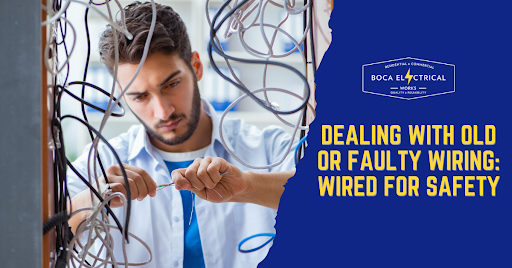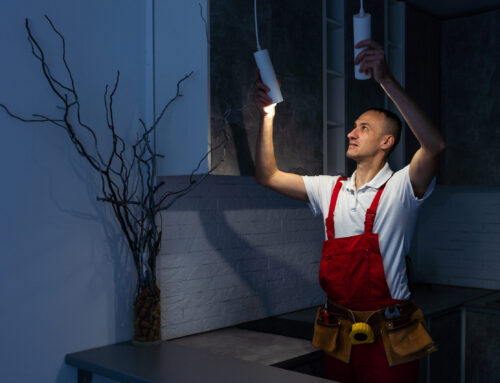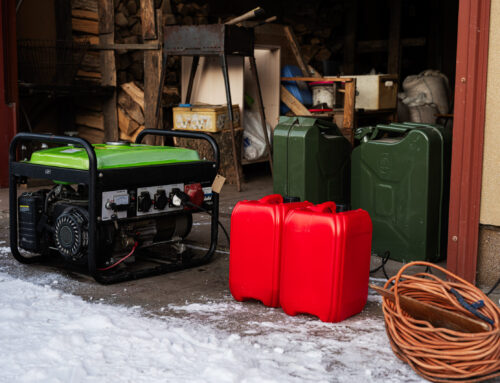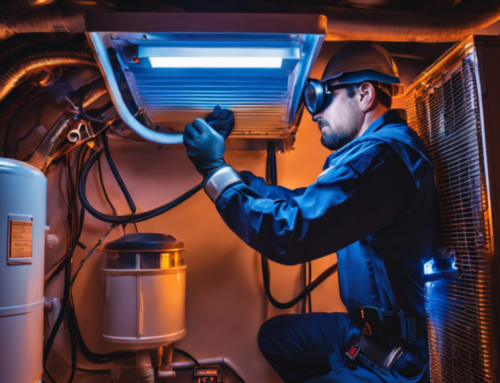Dealing with Old or Faulty Wiring: Wired for Safety
In the realm of home safety, addressing old or faulty wiring stands as a paramount concern. As the backbone of your home’s electrical infrastructure, outdated wiring poses potential risks that can compromise the safety and well-being of your household. This blog aims to shed light on the critical importance of dealing with such wiring issues proactively. Join us on a journey through the intricacies of residential electrical safety, as we explore the signs, risks, and effective solutions to ensure your home is truly wired for safety.
Understanding the Risks of Outdated Wiring
Outdated wiring in residential settings can give rise to a myriad of potential hazards, posing threats to both property and human safety. It’s crucial to comprehend these risks to take proactive measures and ensure a secure living environment. Here’s a breakdown of the potential hazards associated with outdated wiring:
- Fire Hazards: Aging wiring, often accompanied by worn insulation and exposed conductors, significantly increases the risk of electrical fires. The compromised insulation can lead to short circuits and arcing, creating an environment conducive to flames.
- Electrical Shocks: Outdated wiring may lack the protective features of modern systems, making residents vulnerable to electrical shocks. Faulty wiring can expose individuals to live wires, resulting in injuries or, in extreme cases, fatalities.
- Power Surges: As wiring ages, it becomes more susceptible to power surges. These surges can damage electronic devices and appliances connected to the electrical system, leading to financial losses.
- Inadequate Power Supply: Older wiring systems might struggle to meet the demands of modern electrical appliances and technology. This can lead to overloaded circuits, tripped breakers, and a diminished capacity to support the electrical needs of a household.
- Increased Energy Costs: Outdated wiring is often less energy-efficient. Inefficiencies in the electrical system can contribute to higher energy consumption, leading to increased utility bills for homeowners.
Signs of Aging Wiring
Recognizing the signs of aging or faulty residential wiring is crucial for homeowners to address potential hazards promptly. Here are common indicators that your home’s wiring may be showing signs of aging:
- Flickering Lights: Persistent flickering or dimming of lights, especially when using other appliances, can signal an issue with the electrical wiring. It may indicate loose connections, damaged wiring, or insufficient power supply.
- Burn Marks or Discoloration: Visual cues such as burn marks or discoloration around outlets, switches, or electrical panels are red flags. These signs suggest overheating, which can lead to fire hazards if not addressed promptly.
- Tripped Circuit Breakers: Frequent tripping of circuit breakers is a clear indication of an overloaded electrical system. This may occur if the wiring is unable to handle the electrical load, leading to safety concerns.
- Electrical Shocks or Sparks: Experiencing mild shocks or noticing sparks when plugging in or unplugging devices is a serious concern. It suggests potential issues with the insulation or the integrity of the wiring, posing risks of electrical accidents.
- Burning Odor: A persistent burning smell, even if faint, should never be ignored. It could indicate overheating wires or components, signaling an imminent risk of fire.
Identifying Damaged Insulation
Understanding the risks associated with damaged insulation is crucial for maintaining a safe residential electrical system. Here’s an exploration of how damaged insulation can pose risks and ways to recognize it:
- Fire Hazard: Damaged or deteriorating insulation exposes the conductors within the wiring, increasing the likelihood of a short circuit. The resulting sparks or overheating can escalate into a serious fire hazard, especially if the damaged area is near flammable materials.
- Electrical Shocks: Insulation serves as a protective barrier, preventing direct contact with live wires. When insulation is compromised, there is an elevated risk of electrical shocks, as individuals or objects may inadvertently come into contact with exposed conductors.
- Reduced Insulation Efficiency: Damaged insulation compromises its ability to efficiently insulate against electrical currents. This reduction in insulation efficiency can lead to power leakage, resulting in energy wastage and potentially higher utility bills.
- Visual Inspection: Conduct regular visual inspections of wiring, paying attention to any visible signs of wear, fraying, or damage to the insulation. This includes inspecting exposed wiring in outlets, switches, and electrical panels.
- Professional Inspection: Engage the services of a qualified electrician for a comprehensive inspection. Professionals can use specialized tools to assess insulation integrity and identify areas that may need repair or replacement.
The Impact on Home Safety
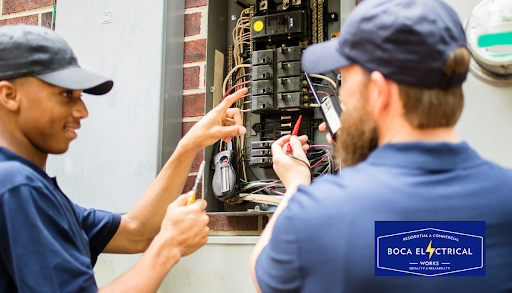
Understanding the implications of outdated wiring on overall home safety is essential for homeowners to prioritize necessary upgrades. Here’s an exploration of the potential consequences:
- Increased Fire Risk: Outdated wiring is a significant contributor to residential fires. Aging insulation, worn-out components, and compromised connections elevate the risk of electrical faults that can lead to devastating fires, endangering lives and property.
- Electrical Accidents: Faulty wiring increases the likelihood of electrical accidents, including shocks and sparks. These incidents pose immediate dangers to residents and can result in injuries or even fatalities, emphasizing the importance of a secure electrical system.
- Damage to Appliances: Older wiring systems may struggle to provide a stable and efficient power supply. This instability can damage sensitive electronic devices and appliances, leading to financial losses for homeowners who need to replace or repair affected items.
- Disruptions to Daily Activities: Frequent power outages, tripped breakers, or other issues related to outdated wiring can disrupt daily activities and compromise the convenience of modern living. A reliable electrical system is crucial for maintaining a comfortable and functional home environment.
- Impact on Property Value: Outdated wiring can negatively affect the resale value of a property. Homebuyers often prioritize safety and modern amenities, making electrical system upgrades a valuable investment that can enhance the market appeal of a home.
Fire Hazards and Prevention
Exploring the increased risk of fire associated with outdated wiring is crucial for homeowners to implement preventive measures. Here’s an overview of the risks and ways to prevent fire hazards:
- Overheating Due to Overloaded Circuits: Outdated wiring may struggle to handle the increased demand for electricity in modern homes. Overloaded circuits can overheat, leading to potential fire hazards. Regularly assess the electrical load and consider redistributing appliances to prevent overloading.
- Compromised Insulation: Worn-out or damaged insulation exposes wiring to surrounding materials, creating a conducive environment for fires. Regularly inspect wiring for signs of damage and address any issues promptly to maintain the integrity of insulation.
- Outdated Fuse Boxes or Panels: Older homes may still have outdated fuse boxes or panels that are not equipped to handle modern electrical demands. Upgrading to a circuit breaker panel with proper overload protection is a proactive measure to prevent electrical fires.
- Regular Electrical Inspections: Schedule regular inspections by a qualified electrician to identify potential fire risks. Professionals can detect issues such as loose connections, faulty wiring, or outdated components that may contribute to fire hazards.
- Investing in Fire Prevention Systems: Consider installing fire prevention systems, such as arc-fault circuit interrupters (AFCIs) and ground-fault circuit interrupters (GFCIs), which can detect and interrupt electrical faults before they escalate into fires.
Upgrading Options for Residential Wiring
When it comes to upgrading residential wiring, homeowners have various solutions to enhance safety and efficiency. Explore the following options for upgrading your home’s electrical system:
- Complete Rewiring: In cases of severely outdated or damaged wiring, a complete rewiring of the home may be the most effective solution. This involves replacing all the electrical wiring and components to meet modern safety standards.
- Upgrading to Modern Wiring Technologies: Embrace modern wiring technologies, such as copper or aluminum wiring, which offer improved conductivity and durability. These materials are more resistant to wear and corrosion, ensuring a longer lifespan for the electrical system.
- Installation of Arc-Fault Circuit Interrupters (AFCIs): AFCIs are advanced electrical safety devices that can detect and mitigate the risk of electrical fires caused by arc faults. Integrating AFCIs into the electrical system enhances fire safety.
- Upgrading Electrical Panels: Modernize your electrical panel to accommodate the increased demand for power in contemporary homes. An upgraded panel with sufficient amperage ensures a stable and safe power supply, reducing the risk of overloads and electrical faults.
- Smart Home Wiring Integration: Consider integrating smart home technologies into your wiring upgrade. Smart wiring systems allow for centralized control of lighting, appliances, and security features, enhancing convenience and energy efficiency.
Modern Wiring Technologies
Exploring modern wiring options unveils advanced technologies that significantly enhance the safety and efficiency of residential electrical systems. Here are the benefits and features of modern wiring technologies:
| Modern Wiring Technologies | Advantages | Benefits |
| Copper Wiring | – Excellent conductivity and heat resistance. | – Reduced risk of overheating. – Enhanced durability and longevity. |
| Aluminum Wiring | – Lightweight and cost-effective. | – Improved conductivity. – Corrosion resistance. – Compatibility with modern electrical demands. |
| Multi-Conductor Cables | – Consolidates multiple wires into a single, organized cable. | – Streamlined wiring systems. – Reduced installation time. – Improved safety with organized cabling. |
| Non-Metallic Sheathed Cable (NM) | – Uses thermoplastic insulation for flexibility and ease of installation. | – Versatility for various applications. – Reduced risk of short circuits. – Enhanced safety during installation. |
| Fiber Optic Wiring | – Uses light signals for high-speed data transmission. | – Immunity to electromagnetic interference. – Increased bandwidth for data transfer. – Enhanced reliability for smart home applications. |
Hiring Professional Wiring Services
When seeking a reliable electrical service, homeowners should carefully assess key qualifications to ensure the safety and efficiency of their electrical system. Here are the crucial qualifications to look for:
- Licensed and Insured: A reliable electrical service should possess the necessary licenses, indicating compliance with local regulations. Insurance coverage is crucial to protect both the homeowner and the service provider in case of accidents or damages during the job.
- Years of Experience: Extensive experience in the field demonstrates a service provider’s ability to handle various electrical issues. Look for a company with a proven track record and a history of successfully completing projects similar to yours.
- Positive Customer Reviews: Customer reviews and testimonials provide insights into the service provider’s reputation and customer satisfaction. Look for positive feedback regarding the quality of work, professionalism, and adherence to safety standards.
- Expertise in Residential Wiring: Specialization in residential wiring ensures that the service provider is well-versed in the specific needs and challenges of home electrical systems. Verify their expertise in handling issues related to outdated or faulty wiring in residential properties.
- Warranty and Guarantees: A reliable electrical service should offer warranties or guarantees for their work. This demonstrates their confidence in the quality of their services and provides homeowners with assurance and recourse in case issues arise after the completion of the project.
Key Takeaway
Ensuring the safety of your home begins with prioritizing updated wiring solutions. By upgrading to modern wiring technologies and enlisting the expertise of qualified electrical services, homeowners can safeguard their residences against potential hazards associated with outdated or faulty wiring. Comprehensive inspections, proactive maintenance, and adherence to safety standards are essential steps in maintaining a secure electrical system. By investing in these measures, homeowners not only protect their property and loved ones but also enjoy peace of mind knowing that their home is truly wired for safety..
Frequently Asked Questions
Explore our comprehensive FAQs to gain insights into critical aspects of residential wiring, addressing common queries regarding safety, inspection frequency, causes of faults, the duration of rewiring processes, and government regulations governing home wiring upgrades.
Can I Upgrade My Wiring Myself?
Upgrading wiring is a complex task that requires specialized knowledge and skills. It is strongly recommended to hire a qualified electrician for wiring upgrades to ensure safety and compliance with electrical codes.
How Often Should Residential Wiring Be Inspected?
Regular electrical inspections are crucial for maintaining a safe home. It is advisable to schedule a professional inspection every 5-10 years, or immediately if you notice signs of aging wiring, such as flickering lights or burnt odors.
What Are the Most Common Causes of Faulty Wiring?
Common causes of faulty wiring include aging insulation, wear and tear, overloaded circuits, and poor installation. Regular inspections and addressing issues promptly can help mitigate these risks.
Is Rewiring a Time-Consuming Process?
The duration of a rewiring process depends on various factors, including the size of the property and the extent of the upgrade. While it may take a few days to complete, the long-term benefits in terms of safety and efficiency make it a worthwhile investment.
Are There Government Regulations for Home Wiring Upgrades?
Yes, there are government regulations and electrical codes that dictate standards for home wiring upgrades. Compliance with these regulations is essential to ensure the safety and legality of the electrical work. Hiring a licensed electrician helps in meeting these requirements.
Secure Your Home Today with Bocaelectrical’s Expert Wiring Services
Empower your home with cutting-edge safety measures—contact Bocaelectrical’s seasoned professionals for comprehensive and reliable residential wiring services, ensuring the utmost security for your property and loved ones.


